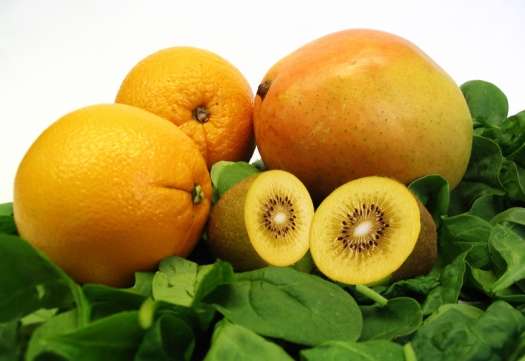KiwiOrangeSpinach.jpg

Photo by Berkeley Robinson, ©2005, edited / freeimages.com
Gold kiwifruit and citrus fruits are high in Vitamin C and green leafy vegetables are rich in beta-carotene.
The Center for Disease Control asserts that the "best way to prevent the flu is by getting a flu vaccine every year." They provide employers and businesses with materials and tools to promote flu vaccination. Flu shots are available at most major grocery stores, drug stores, and doctors' offices. But with an effectiveness rate between 27% and 56%, the flu shot cannot come close to providing absolute assurance against falling ill this season.1 Whatever your decision, you can follow the suggestions here to give your body an extra boost of prevention.
I would assert that the best way to prevent the flu is by living a lifestyle that supports a healthy immune system. In this article we discuss evidence to support the benefits of healthy lifestyle, healthy diet, and nutritional supplementation for flu prevention.
Healthy Lifestyle
The first place to start is with adequate sleep. During sleep our bodies rebuild, detoxify, and replenish. Men with total sleep deprivation or rapid eye movement (REM) sleep deprivation experience changes in their immune profile, some of which does not correct after sleep recovery.2 People with sleep deprivation following a flu vaccine have reduced antibody production five days later.3 If you sleep well, you may be less likely to get the flu this year.
The next step is to recognize and minimize stress. Nurses who have the most avoidant personality style also have the lowest Natural Killer cell (white blood cell) function.4 Hospitalized children who are visited by smiling artists (such as puppeteers or storytellers) produce significantly higher levels of white blood cells to help them fight disease.5 It is worth some reflection to identify the things that cause stress in your life and make time for the things that make you happy.
Exercise can work either for or against your immune system. While intense exercise can suppress immunity, moderate exercise improves immune function and potentially decreases the risk and severity of upper respiratory viral infections.6 Find a form of exercise that you enjoy and commit to a regular schedule of doing it.
Healthy Diet
Food choices have a powerful effect on immune health. We have known for years that sugar suppresses immune function. A 1973 study showed that simple sugars (including fructose, glucose, sucrose, honey and even orange juice) could decrease white blood cells' ability to fight infection for up to 5 hours after ingestion.7 While the dosage used in this study was high (100 grams), the evidence suggests that chronic consumption of sugar may suppress immunity.
Adequate protein intake is also foundational to a healthy immune system. Immune function relies on a complex network of complement proteins, cytokines, and antibodies to ward off disease. All of these are proteins that the body creates from amino acids from our food. To help boost your resistance to the flu, include healthy protein rich foods such as grass-fed beef, organic chicken, fish, eggs, or beans every day.
Zinc-rich foods are also critical to optimize immune resistance. Chronic zinc deficiency suppresses immune function. To boost resistance to infection, it is best to get zinc from foods such as oysters, grass-fed meats, nuts, and seeds. Fortified foods do not necessarily provide immune benefit. Children who ate fortified cereal (which included zinc) did not exhibit any immune benefit compared to those who ate unfortified cereal over the course of two winter months.8
Finally, it is critical to load the diet heavily on fruits and vegetables. These provide nature's richest sources of vitamins C, E, beta-carotene, and other phytonutrients. Gold kiwifruit is high in all of these nutrients. In a randomized trial of the elderly, eating this gold kiwi reduced duration and severity of upper respiratory tract infections.9 Vitamin C is particularly important for the immune system and is found in bell peppers, citrus fruits, and broccoli. Beta-carotene rich foods include carrots, squash, pumpkins, and green leafy vegetables like kale. While studies on dried fruit and vegetable capsules demonstrate immune benefit,10 we can do equally well or better by eating real food.
Nutritional Supplements
While a healthy lifestyle and diet are the best immune support, there are also some nutritional supplements that can be taken preventively through the flu season. Please consult your doctor for interactions if you are taking any prescription medications or being treated for any chronic disease.
Probiotics top the list. Probiotics are the beneficial bacteria that grow in your gut, your mucous membranes, and on your skin. Scientific evidence is solid that they help to support and modulate immune function.11, 12, 13, 14 One novel probiotic strain called Lactobacillus plantarum has actually demonstrated to be active against influenza infection in mice.15 We do not know if other strains might also strengthen our resistance to the flu. The most common recommendation is to take a product that includes a variety of organisms. Eating fermented foods such as yogurt, kefir, and sauerkraut are also effective ways to boost your beneficial flora.
Many people can benefit from vitamin D supplementation. Immune cells possess vitamin D receptors, which suggests this nutrient may play an important role in the immune response to infections.16 There is evidence that a link between vitamin D and influenza risk does exist and supplementation yields promising results.16 Statistics show that Americans have a very high prevalence of vitamin D deficiency.17 This deficiency may be worse during the winter months when there is less sun exposure, which makes supplementing vitamin D a good idea for flu prevention.
Garlic can be used in food, but also as a supplement. People who take aged garlic capsules (2.56 grams/day) have reduced severity, duration, and incidence of colds and flu.18
Finally
Finally, don't forget to sneeze into your elbow and always wash your hands. If you should end up catching the flu, be sure to read What To Do When You Get the Flu.
References
1. Interim Adjuted Estimates of Seasonal Influenza Vaccine Effectiveness - United States February 2013. Morbidity and Mortality Weekly Report. 2013
2. Ruiz FS, Andersen ML, Martins RC, Zager A, Lopes JD, Tufik S. Immune alterations after selective rapid eye movement or total sleep deprivation in healthy male volunteers. Innate Immun. 2012;18 (1):44-54.
3. Benedict C, Brytting M, Markstrom A, Broman JE, Schioth HB. Acute sleep deprivation has no lasting effects on the human antibody titer response following a novel influenza A H1N1 virus vaccination. BMC Immunol. 2012;13 1.
4. Picardi A, Miglio R, Tarsitani L et al. Attachment style and immunity: a 1-year longitudinal study. Biol Psychol. 2013;92 (2):353-358.
5. Beres A, Lelovics Z, Antal P et al. ["Does happiness help healing?" Immune response of hospitalized children may change during visits of the Smiling Hospital Foundation's Artists]. Orv Hetil. 2011;152 (43):1739-1744.
6. Stephen MA, Pence BD, Woods JA. Exercise and Respiratory Viral Infections. Exerc Sport Sci Rev. 2009;37 (4):157-164.
7. Sanchez A, Reeser JL, Lau HS et al. Role of sugars in human neutrophilic phagocytosis. Am J Clin Nutr. 1973;26 (11):1180-1184.
8. Nieman DC, Henson DA, Sha W. Ingestion of micronutrient fortified breakfast cereal has no influence on immune function in healthy children: a randomized controlled trial. Nutr J. 2011;10 36.
9. Hunter DC, Skinner MA, Wolber FM et al. Consumption of gold kiwifruit reduces severity and duration of selected upper respiratory tract infection symptoms and increases plasma vitamin C concentration in healthy older adults. Br J Nutr. 2012;108 (7):1235-1245.
10. Nantz MP, Rowe CA, Nieves CJ, Percival SS. Immunity and antioxidant capacity in humans is enhanced by consumption of a dried, encapsulated fruit and vegetable juice concentrate. J Nutr. 2006;136 (10):2606-2610.
11. Rizzello V, Bonaccorsi I, Dongarrà ML, Fink LN, Ferlazzo G. Role of Natural Killer and Dendritic Cell Crosstalk in Immunomodulation by Commensal Bacteria Probiotics. Journal of Biomedicine and Biotechnology. 2011;2011 1-10.
12. Hemarajata P, Versalovic J. Effects of probiotics on gut microbiota: mechanisms of intestinal immunomodulation and neuromodulation. Therapeutic Advances in Gastroenterology. 2012;6 (1):39-51.
13. Jeppsson B, Mangell P, Thorlacius H. Use of Probiotics as Prophylaxis for Postoperative Infections. Nutrients. 2011;3 (12):604-612.
14. Reid G, Jass J, Sebulsky MT, McCormick JK. Potential Uses of Probiotics in Clinical Practice. Clinical Microbiology Reviews. 2003;16 (4):658-672.
15. Kechaou N, Chain F, Gratadoux J-J et al. Identification of One Novel Candidate Probiotic Lactobacillus plantarum Strain Active against Influenza Virus Infection in Mice by a Large-Scale Screening. Applied and Environmental Microbiology. 2013;79 (5):1491-1499.
16. Sundaram ME, Coleman LA. Vitamin D and Influenza. Advances in Nutrition: An International Review Journal. 2012;3 (4):517-525.
17. Forrest KY, Stuhldreher WL. Prevalence and correlates of vitamin D deficiency in US adults. Nutr Res. 2011;31 (1):48-54.
18. Nantz MP, Rowe CA, Muller CE, Creasy RA, Stanilka JM, Percival SS. Supplementation with aged garlic extract improves both NK and gammadelta-T cell function and reduces the severity of cold and flu symptoms: a randomized, double-blind, placebo-controlled nutrition intervention. Clin Nutr. 2012;31 (3):337-344.


